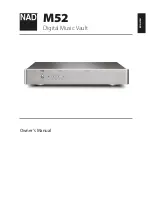
TKF-13
– USER MANUAL
9
2
Phase rotation direction test
Press
to turn the tester on. The green diode should go ON
signalling that the device is ready for operation.
Connect measurement probes to the TKF-13 tester.
Connect measurement probes to the points where there is the ex-
pected three-phase voltage (see the illustration below).
If the phases at the given measurement points are compliant with
the L1, L2, L3 description, the R diode of the tester will go on;
otherwise the L diode will go on.
The light of the given neon lamp (L1, L2, L3) signalises a voltage
exceeding 100 V between the corresponding probe and one of the
remaining probes.
Incorrect indications of the tester may be caused by one of
the following:
connection of two probes to one phase,
connection of one of the probes to the neutral lead,
lack of connection of one of the probes to the mains.
3
Motor shaft rotation direction (using leads)
Disconnect the motor from the mains.
Press
to turn the tester on. The green diode should go ON
signalling that the device is ready for operation.
Connect measurement probes to the TKF-13 tester.
Connect measurement probes to the tested motor (see the adja-
cent illustration).
Rotate the motor shaft energetically in the desired direction.
The light of the R diode means the connection to the U, V and W
motor terminals of phases L1, L2 and L3, respectively, will cause
rotation of the motor in the direction the shaft spun during the test.
The light of the L diode means the connection to the U, V and W
motor terminals of phases L1, L2 and L3, respectively, will cause
rotation of the motor in the opposite direction to the direction the
shaft spun during the test.
Make sure the shaft rotates in the desired direction once the mo-
tor has been connected to the power supply source performing a
phase sequence test (see Chapter 2).












































